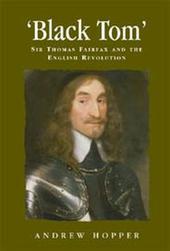
|
Black Tom: Sir Thomas Fairfax and the English Revolution
Paperback / softback
Main Details
| Title |
Black Tom: Sir Thomas Fairfax and the English Revolution
|
| Authors and Contributors |
By (author) Andrew Hopper
|
| Series | Politics, Culture and Society in Early Modern Britain |
|---|
| Physical Properties |
| Format:Paperback / softback | | Pages:272 | | Dimensions(mm): Height 234,Width 156 |
|
| Category/Genre | British and Irish History |
|---|
| ISBN/Barcode |
9780719071096
|
| Classifications | Dewey:942.062092 |
|---|
| Audience | |
|---|
| Illustrations |
Illustrations, black & white
|
|
Publishing Details |
| Publisher |
Manchester University Press
|
| Imprint |
Manchester University Press
|
| Publication Date |
30 April 2007 |
| Publication Country |
United Kingdom
|
Description
Sir Thomas Fairfax, not Oliver Cromwell, was creator and commander of Parliament's New Model Army from 1645 to1650. Although Fairfax emerged as England's most successful commander of the 1640s, this book challenges the orthodoxy that he was purely a military figure, showing how he was not apolitical or disinterested in politics. The book combines narrative and thematic approaches to explore the wider issues of popular allegiance, puritan religion, concepts of honour, image, reputation, memory, gender, literature, and Fairfax's relationship with Cromwell. 'Black Tom' delivers a groundbreaking examination of the transformative experience of the English revolution from the viewpoint of one of its leading, yet most neglected, participants. It is the first modern academic study of Fairfax, making it essential reading for university students as well as historians of the seventeenth century. Its accessible style will appeal to a wider audience of those interested in the civil wars and interregnum more generally. -- .
Author Biography
Andrew Hopper is Lecturer in History in the Centre for English Local History at the University of Leicester -- .
Reviews"This is an important, well written and convincingly argued book, covering the career of a major, and neglected, figure from the period."--Patrick Little, History of Parliament Trust
|